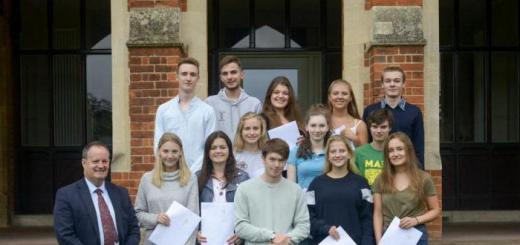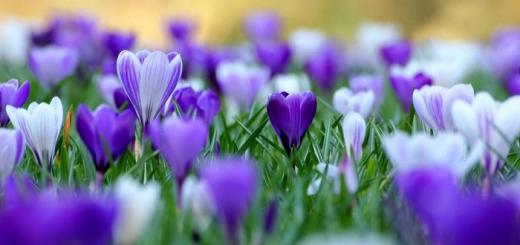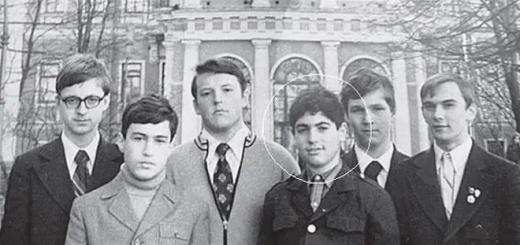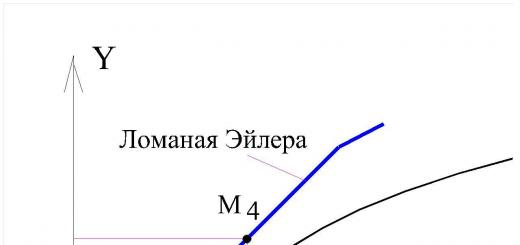L. N. Tolstoy An excerpt describing spring from “Anna Karenina”
Part two, chapter XII.
…..
Spring did not open for a long time. During the last weeks of Lent the weather was clear and frosty. During the day it melted in the sun, and at night it reached seven degrees; The weather was such that they drove carts without roads, Easter was in the snow. Then suddenly, on the second Holy Day, a warm wind blew, clouds moved in, and for three days and three nights it rained stormy and warm. On Thursday the wind died down and a thick gray fog moved in, as if hiding the secrets of the changes taking place in nature. Water flowed in the fog, ice floes crackled and moved, muddy, foaming streams moved faster, and on Krasnaya Gorka itself, in the evening, the fog broke, the clouds scattered like whitecaps, it cleared up, and real spring opened up. The next morning, the bright sun that rose quickly ate away the thin ice that covered the waters, and all the warm air trembled from the evaporations of the revived earth that filled it. The old grass and the young grass emerging with needles turned green, the buds of the viburnum, currants and sticky alcoholic birch swelled, and on the vines sprinkled with golden flowers the exposed flying bee began to hum. Invisible larks began to sing over the green velvet and icy stubble, lapwings cried over the lowlands and swamps filled with brown, unremoved water, and cranes and geese flew high with the spring cackling. Mangy cattle, only in some places not yet moulted, roared in the pastures, bandy-legged lambs began to play around their bleating mothers, who were losing their wave, fast-footed children ran along drying paths with the imprints of bare feet, the cheerful voices of women with canvases crackled on the pond, and the axes of men clattering in the courtyards, setting up plows and harrows. Real spring has come.
in spring
Chekhov A. P
The snow has not yet melted from the ground, but spring is already asking for the soul. If you have ever recovered from a serious illness, then you know the blissful state when you freeze with vague premonitions and smile for no reason. Apparently, nature is now experiencing the same state. The ground is cold, the mud and snow squish underfoot, but how cheerful, affectionate, and welcoming everything is all around! The air is so clear and transparent that if you climb a dovecote or a bell tower, you seem to see the entire universe from edge to edge. The sun is shining brightly, and its rays, playing and smiling, bathe in the puddles along with the sparrows. The river swells and darkens; she has already woken up and will not start crying today or tomorrow. The trees are bare, but they already live and breathe.
At such times, it is good to push dirty water in ditches with a broom or shovel, launch boats on the water, or break stubborn ice with your heels. It’s also good to chase pigeons to the very heights of heaven or climb trees and tie birdhouses there. Yes, everything is fine at this happy time of year, especially if you are young, love nature, and if you are not capricious, not hysterical, and if your job does not require you to sit within four walls from morning to evening. It’s not good if you are sick, if you languish in the office, if you know muses.....
Meeting spring: (Discussion)
Chekhov A. P
Boreas was replaced by zephyrs. The breeze is blowing either from the west or from the south (I’ve only recently been to Moscow and haven’t yet fully grasped the local countries of the world), it blows lightly, barely touching the coattails... It’s not cold, and it’s not so cold that you can safely wear a hat or coat and with a cane. There is no frost even at night. The snow melted and turned into muddy water, running with a murmur from the mountains and hillocks into dirty ditches; it did not melt only in the alleys and small streets, where it rests serenely under a three-inch brown, earthy layer and will rest until May... In the fields, in the forests and on the boulevards, green grass timidly makes its way... The trees are still completely bare, but they look somehow more cheerful . The sky is so glorious, clear, bright; only occasionally do clouds come and throw small splashes on the ground... The sun shines so well, so warmly and so affectionately, as if it had a nice drink, had a hearty meal and saw an old friend... It smells of young grass, manure, smoke, mold, all kinds of rubbish, steppe and something special... In nature, everywhere you look, there are preparations, chores, endless cooking... The point is that spring is flying.
The public, who are terribly tired of spending money on firewood, walking around in heavy fur coats and ten-pound galoshes, breathing sometimes hard, cold, sometimes bathhouse, apartment air, joyfully, swiftly and standing on their toes, extends their hands towards the flying spring. Spring is a welcome guest, but is it good? How can I tell you? In my opinion, it’s not that she’s too kind, and she can’t say that she’s too evil. Whatever it may be, they are looking forward to it.
Poets old and young, the best and the worst, leaving cashiers, bankers, railway workers and horned men alone for a while, scribble madrigals, dithyrambs, welcoming odes, ballads and other poetic things, singing in them every single delight of spring... As usual, they chant unsuccessfully (I’m not talking about those present). The moon, air, darkness, distance, desires, “she” are in the foreground.
Prose writers are also in a poetic mood. All feuilletons, curses and praises begin and end with a description of their own feelings, inspired by the approaching spring.
The young ladies and gentlemen of that... They are suffering to death! Their pulse beats 190 per minute, their temperature is feverish. Hearts are full of the sweetest forebodings... Spring brings with it love, and love brings with it: “How much happiness, how much torment!” In our drawing, spring is holding a little cupid on a string. And he does it well. And in love you need discipline, but what would happen if she let Cupid down and gave him, the rascal, freedom? I am a very serious person, but even by the grace of spring smells all sorts of devilish things creep into my head. I’m writing, and right in front of my eyes are shady alleys, fountains, birds, “she” and all that stuff. My mother-in-law is already starting to look at me suspiciously, and my little wife keeps hanging out at the window...
Medical people are very serious people, but even they do not sleep peacefully... They are choked by nightmares and have the most seductive dreams. The cheeks of doctors, paramedics, and pharmacists glow with a feverish blush. And no wonder, sir! There are stinking fogs over the cities, and these fogs consist of microorganisms that produce diseases... Chests, throats, teeth hurt... Old rheumatisms, gout, neuralgia are playing out. There are tons of consumptives. The crowd in the pharmacies is terrible. Poor pharmacists have no time to have lunch or drink tea. Berthollet's salt, Dover's powder, breast spices, iodine and stupid dental products are sold literally by the ton. As I write, I hear nickels jingling in the neighboring pharmacy. My mother-in-law has gumboil on both sides: freak is freak!
Small businessmen, money savers, practical cannibals, liquids and fists are dancing kachuchu for joy. Spring is a benefactor for them too. A thousand fur coats go to loan banks to be eaten by hungry moths. Everything warm, which has not yet ceased to be valuable, rushes towards liquid benefactors. If you don’t borrow a fur coat, you’ll be left without a summer dress, and you’ll be sporting beavers and raccoons at the dacha. For my fur coat, which costs at least 100 rubles, I was given a loan of 32 rubles.
In Berdichev, Zhitomir, Rostov, Poltava there is knee-deep mud. The mud is brown, sticky, smelly... Passers-by sit at home and don’t turn their noses to the street: you’ll drown in God knows what. You leave not only your galoshes in the mud, but even your boots and socks. If necessary, go outside, either barefoot or on stilts, or best of all, don’t walk at all. In Mother Moscow, to be fair, you can’t leave your boots in the mud, but you’ll certainly get them in your galoshes. You can say goodbye to galoshes forever only in very few places (namely: on the corner of Kuznetsky and Petrovka, on Truba and almost all squares). You can’t go from village to village, you can’t walk.
Everyone is going to walk and rejoice, except for the youths and young men. Young people won’t even see exams in the spring. The whole of May will be spent on getting A's and 1's. For individuals, spring is not a welcome guest.
Wait a little, in 5-6 days, many in a week, the cats will sing louder under the windows, the liquid mud will become thick, the buds on the trees will become fluffy, the grass will appear everywhere, the sun will bake - and the real spring will set in. Convoys with furniture, flowers, mattresses and maids will come from Moscow. Gardeners and gardeners will begin to dig around... Hunters will begin to load their guns.
Wait a week, be patient, and in the meantime, put strong bandages on your chests so that your raging, urgent hearts do not jump out of your chests...
By the way, how would you like to depict spring on paper? In any form? In the old days, she was depicted as a beautiful maiden scattering flowers on the ground. Flowers are synonymous with joy... Now times are different, morals are different, spring is different. We also depict her as a lady. There are no flowers, because there are no flowers and no hands in the muff. We should portray her as skinny, thin, skeletal, with a consumptive blush, but let her be comme il faut!1 We make this concession to her only because she is a lady.
, about nature, about the weather.
Oh, spring without end and without edge -
An endless and endless dream!
I recognize you, life! I accept!
And I greet you with the ringing of the shield!
I accept you, failure,
And good luck, my greetings to you!
In the enchanted area of crying,
There is no shame in the secret of laughter!
I accept sleepless arguments,
Morning in the curtains of dark windows,
So that my inflamed eyes
Spring was annoying and intoxicating!
I accept desert weights!
And the wells of earthly cities!
The illuminated expanse of the skies
And the languor of slave labor!
And I meet you at the doorstep -
With a wild wind in snake curls,
With an unsolved name of god
On cold and compressed lips...
Before this hostile meeting
I will never give up my shield...
You will never open your shoulders...
But above us is a drunken dream!
And I look and measure the enmity,
Hating, cursing and loving:
For torment, for death - I know -
All the same: I accept you!
(Alexander Blok)
I came to you with greetings...
I came to you with greetings,
Tell me that the sun has risen
What is it with hot light
The sheets began to flutter;
Tell me that the forest has woken up,
All woke up, every branch,
Every bird was startled
And full of thirst in spring;
Tell me that with the same passion,
Like yesterday, I came again,
That the soul is still the same happiness
And I’m ready to serve you;
Tell me that from everywhere
It blows over me with joy,
That I myself don’t know what I will
Sing - but only the song is ripening.
(Afanasy Fet)
Spring evening
The silver river flows quietly
In the kingdom of evening green spring.
The sun sets behind the forested mountains.
A golden horn emerges from the moon.
The West is covered with a pink ribbon,
The plowman returned to the hut from the fields,
And beyond the road in the birch thicket
The nightingale sang a song of love.
Listens affectionately to deep songs
From the west the dawn is like a pink ribbon.
Looks tenderly at the distant stars
And the earth smiles at the sky.
(Sergey Yesenin)

Spring
Spring, spring! how clean the air is!
How clear is the sky!
Its azuria alive
He blinds my eyes.
Spring, spring! how high
On the wings of the breeze,
Caressing the sun's rays,
They're flying!
The streams are noisy! the streams are shining!
Roaring, the river carries
On the triumphant ridge
The ice she raised!
The trees are still bare,
But in the grove there is a decaying leaf,
As before, under my foot
And noisy and fragrant.
Soared under the sun
And in the bright heights
The invisible lark sings
A cheerful hymn to spring.
(Evgeny Baratynsky)
Spring thunderstorm
I love the storm in early May,
When spring, the first thunder,
as if frolicking and playing,
Rumbling in the blue sky.
Young peals thunder,
The rain is splashing, the dust is flying,
Rain pearls hung,
And the sun gilds the threads.
A swift stream runs down the mountain,
The noise of birds in the forest is not silent,
And the din of the forest and the noise of the mountains -
Everything cheerfully echoes the thunder.
You will say: windy Hebe,
Feeding Zeus's eagle,
A thunderous goblet from the sky,
Laughing, she spilled it on the ground.
(Fedor Tyutchev)
Pleshcheev - Country song (excerpt)
The grass is turning green
The sun is shining;
Swallow with spring
It flies towards us in the canopy.
With her the sun is more beautiful
And spring is sweeter...
Chirp out of the way
Greetings to us soon!
I'll give you some grains
And you sing a song,
What from distant countries
I brought with me...
Tyutchev - Spring waters
The snow is still white in the fields,
And in the spring the waters are noisy -
They run and wake up the sleepy shore,
They run and shine and shout...
They say all over:
"Spring is coming, spring is coming,
We are messengers of young spring,
She sent us ahead!"
Spring is coming, spring is coming!
And quiet, warm May days
Ruddy, bright round dance
The crowd cheerfully follows her.
Block - In the meadow
The forests in the distance are more visible,
Blue skies
More noticeable and blacker
There is a stripe on the arable land,
And children's sounds are louder
Voices above the meadow.
Spring is passing by
But where is she herself?
Chu, a clear voice is heard,
Isn't this spring?
No, it's loud, subtle
A wave gurgles in the stream...
Apollo Maykov - Spring
Blue, clean
Snowdrop flower!
And next to it is a drafty one,
The last snowball...
Last tears
About the grief of the past
And the first dreams
About other happiness.
Tyutchev - Spring
 No wonder winter is angry,
No wonder winter is angry,
Its time has passed -
Spring is knocking on the window
And he drives him out of the yard.
And everything started to fuss,
Everything is forcing winter out -
And larks in the sky
The ringing bell has already been raised.
Winter is still busy
And he grumbles about Spring.
She laughs in her eyes
And it just makes more noise...
The evil witch went crazy
And, capturing the snow,
She let me in, running away,
To a beautiful child...
Spring and grief are not enough:
Washed in the snow
And only became blusher
Against the enemy.
Zhukovsky - Lark
In the sun the dark forest glowed,
In the valley thin steam whitens,
And he sang an early song
In the azure the lark is ringing.
It’s so easy for me here, it’s so welcoming,
So boundless, so airy;
I see God's whole world here.
And my song praises God!
Tyutchev - Spring thunderstorm
I love the storm in early May,
When spring, the first thunder,
as if frolicking and playing,
Rumbling in the blue sky.
Young peals thunder,
The rain is splashing, the dust is flying,
Rain pearls hung,
And the sun gilds the threads.
A swift stream runs down the mountain,
The noise of birds in the forest is not silent,
And the din of the forest and the noise of the mountains -
Everything cheerfully echoes the thunder.
You will say: windy Hebe,
Feeding Zeus's eagle,
A thunderous goblet from the sky,
Laughing, she spilled it on the ground.
Pleshcheev - The snow is already melting, streams are flowing...
The snow is already melting, the streams are flowing,
There was a breath of spring through the window...
The nightingales will soon whistle,
And the forest will be dressed in leaves!
Pure heavenly azure,
The sun became warmer and brighter,
It's time for evil blizzards and storms
gone for a long time again...
Spring in the verses of Russian poets
S. A. Yesenin’s poem “Bird cherry” vividly and colorfully describes both the awakening of nature and the talent of the author. Masterfully mastering the word, the poet immerses the reader in the subtle aroma of blooming nature, immersing him headlong in the spring riot of sounds and colors. Iambic bimeter and cross rhyme create a stunning presence effect. The creation, unusually rich in epithets, unusually accurately conveys the author’s attitude towards the Motherland and its unique beauty.
Zhukovsky’s poem “Lark” combines vivid auditory and visual images. Describing the beginning of the day, the poet addresses the reader in the first person, philosophizing about the divine nature of the universe. The work is full of homogeneous adverbs, which cannot but enhance the conveyance of the emotions of the author, captivated by the feathered messenger of spring. He easily and simply explains to children about topics that are fundamental to him.
Imbued with sounds and colors, Tyutchev’s creation “Spring Thunderstorm” takes us into a pre-storm atmosphere saturated with ozone. A striking example of talented alliteration with the sounds “g” and “r” allows you to hear the first rumbles of thunder in the rhythm of the verse. Replete with epithets and metaphors, the poet conveys the freshness of renewed nature. Associates spring with youth and its violent, loud flow. Skillfully introduces ancient myths, harmoniously diluting the text, while hinting at the unity of all natural principles.
Echoing the weather with the previous author, I. Bunin, writing about rain, plunges into the spring atmosphere. Each of his works is imbued with a feeling of deep love for the world around him. Reading the work, you can feel how each word, like a large heavy drop, confidently knocks on the foliage - “large rain in a green forest.” Philosophical reflections on the transience of life in the last lines reveal the poet from a deep side unknown to the reader.
A. K. Tolstoy’s work “The last snow in the field is melting” conveys his enthusiastic attitude towards nature. Personification and epithet serve as assistants in expressing the hero’s feelings without hiding the intimate nature of the work. The poem was written by the author during separation from his married lover, which could not but give the mood a tragic shade. The author admires the fact that the flow of natural laws is independent of his state of mind. His mental torment will not stop the blossoming of spring, the indisputability of natural laws.
1st, 2nd, 3rd, 4th, 5th, 6th grade

Progress
Recently our whole class went on an excursion to observe the changes in nature with the arrival of spring. The sun was warm like spring, the snow was melting, streams were running, the air was clean and transparent, and the sky was bright blue. Our teacher suggested remembering poems, riddles, and proverbs about spring. And what? We managed to remember only a few poems that we had learned quite recently. Then we decided to find out which poets and writers wrote about spring, how artists reflected this theme in their paintings, what riddles and proverbs there are about spring.
Our class was divided into groups. Each group completed its task. Tatyana Sergeevna helped us with advice in selecting material, designing drawings and poems.
After thinking, we decided to name our project with words from a poem by A.S. Pushkin “With a clear smile, nature greets the morning of the year through a dream.”< Слайд 1>
We were faced with questions. What poets, writers and artists wrote about spring?
Why is spring the favorite season of many great writers and poets? How did artists reflect spring in all its diversity? How was the theme of spring reflected in oral folk art?< Слайд 2>
We decided to get acquainted with the works of various poets, writers and artists, as well as Russian folk art, in which the source of inspiration is the beautiful spring.< Слайд 3>
The first group worked on the topic: “What motivates poets and writers to write about spring?” The second group is “Why are there so many proverbs, sayings, and riddles about spring in Russian folk art.” And the third group is “Spring in the paintings of great artists.”<Слайд 4>
Before getting down to work, we discussed the plan according to which we would work, sources of information, and forms for presenting research results.< Слайд 5,6>
During our work, we visited the school library, the Andersen city children's library, attended an exhibition of paintings in the local history museum, and listened to a lecture on the topic: “Native nature in the works of folk artists.”
At the end of the work we summed up everything we had done.<Слайд 8>
We did a lot of work, as a result of which we learned that many Russian poets and writers wrote about spring. These are F.I. Tyutchev, V.A. Zhukovsky, A.S. Pushkin, A.N. Pleshcheev, S.D. Drozhzhin, L.N. Tolstoy, A.A. Fet, I.S. Nikitin, A N. Maikov, A. P. Chekhov and many others. These poems are beautiful, lyrical and musical. For many generations of people they were favorite reading. Poems and stories about our native nature do not get old, and we repeat and read them again and again. We read and imagine the glare of the sun playing on tree branches and melting snow, in the shade it is still winter, and in the sun there are drops and thawed patches. The first spring rain washed the forests, the slopes were bare of snow, and noisy streams ran through the ravines. Here comes the March sky. Blue, blue, pure, pure. And the birds began to ring, chirp, sing, and whistle. My soul is light, joyful and warm.
Artists in their works reflected spring in all its diversity. These are works by I. Levitan, I. Grabar, V. Baksheev, S. Gerasimov, A. Savrasov, F. Vasiliev and many others. Spring is the time of awakening of nature, its rapid flowering. Russian landscape artists dedicated their paintings to different periods of spring.
In K Yuon’s painting there is a bright March sun, melted snow, shining. like a fabulous blue bowl, the sky, long blue-violet shadows on the melted snow and a village street waking up.<Слайд 9>
And in F. Vasiliev’s painting “The Thaw” there is another sign of spring - spring thaw. The rural road is flooded with water.< Слайд 10>
And what beauty there is in I. Levitan’s painting “March”. In the blue sky, thin birch branches shimmer in different colors. Their white trunks seem to glow, and behind them the dark green of the pine trees. High in the sky on a birch tree, a birdhouse can’t wait for its occupants.<Слайд 12>The April floods of rivers and lakes are expressively depicted in I. Levitan’s painting “Spring. Big water."< Слайд 11>. And his landscape “Blossoming Apple Trees” conveys the beauty of their blossoming.<Слайд 14>
Spring is the favorite time of year for many landscape artists, who are especially sensitive to the poetic beauty of spring nature.
Most of the paintings by these artists are now in the Tretyakov Gallery. Thousands of people admire the works of great masters who put all the power of their love into their paintings.
We decided to present the results of our work in the form of a presentation. Our teacher and parents helped us draw it up. Together with us, they took an active part in collecting material, went with us on excursions, and helped design the album “Spring through the eyes of artists.”
Each group defended their work in turn. We decided that the goals set before starting work had been achieved and rated our work as good.
5th place. The image of spring in Russian poetry is rightfully considered key and has multiple meanings. First of all, this time of year is associated with renewal and purification, symbolizing youth, tenderness and sublimity. Therefore, it is not surprising that spring, as a prototype of a young maiden, is present in the works of many Russian poets, inspired by its beauty, perfection, freshness and spontaneity. The period when spring has not yet come into its own is especially exciting, but its presence is already in the air, filling it with an incomparable aroma. This period was very vividly and accurately depicted by the poet Afanasy Fet in his poem “Still fragrant spring bliss...”, comparing his favorite time of year with the steppe beauty who watches the cranes returning from the south.
*** A. Fet
More fragrant spring bliss
She didn’t have time to come down to us,
The ravines are still full of snow,
Even before dawn the cart rattles
On a frozen path.The sun barely warms at noon,
The linden tree turns red in height,
Through, the birch tree turns a little yellow,
And the nightingale does not yet dare
Sing in a currant bush.But the news of rebirth is alive
Already there are in the passing cranes,
And, following them with my eyes,
The beauty of the steppe is standing
With a bluish blush on her cheeks.
4th place. In turn, the poet Alexander Blok compares spring with a child who shuns adults and does not try to show himself to them, although everyone feels his elusive presence somewhere very close. In a poem "In the meadow" the poet figuratively and succinctly reveals the theme of spring, which seems to pass people by, but its traces are visible and heard everywhere - in the blackened arable land, the bright blue sky and the babbling stream, which creates a festive and surprisingly joyful atmosphere.
“In the Meadow” by A. Blok
The forests in the distance are more visible,
Blue skies
More noticeable and blacker
There is a stripe on the arable land,
And children's sounds are louder
Voices above the meadow.
Spring is passing by
But where is she herself?
Chu, a clear voice is heard,
Isn't this spring?
No, it's loud, subtle
A wave gurgles in the stream.
3rd place. In the works of many Russian poets, spring is presented as one of the most romantic periods, when nature itself evokes thoughts of love and forces one to listen to the rapid beating of the heart. IN Ivan Bunin’s poem “Beyond the river the meadows have turned green...” spring is associated with the expectation of happiness and spiritual anguish, when longing is replaced by causeless joy only because the sun is shining brightly and the world appears in a different, rainbow light. At the same time, spring is an unsaid story about love, a timid expectation of happiness and hope for reciprocity, when feelings are heightened to the limit, but those cherished words that can bring spiritual relief have not yet been spoken out loud.
*** I. Bunin
Across the river the meadows turned green,
The light freshness of water emanates;
More merriment rang through the groves
Bird songs in different modes.The breeze from the fields brings warmth,
The bitter spirit of young lozina...
Oh, spring! How the heart asks for happiness!
How sweet is my sadness in the spring!Gently the sun warms the leaves
And the paths are soft in the garden...
I don’t understand what opens the soul
And where am I slowly wandering!I don’t understand who I love with longing,
Who is dear to me... And does it matter?
I'm waiting for happiness, suffering and yearning,
But I don’t believe in happiness for a long time!I'm sad that I'm wasting my time fruitlessly
The purity and tenderness of better days,
That I alone rejoice and cry
And I don’t know, I don’t like people.
2nd place. IN poem by Alexei Pleshcheev “The snow is already melting” spring, on the contrary, is presented in contrast and very expressively due to the fact that both its sides are shown. For some, running streams and the first leaves on the trees are a real holiday of rebirth, but for others they are a symbol of hard peasant labor. Only children who are not burdened with everyday worries and have not yet forgotten how to feel the beautiful are able to truly enjoy the warm sun, green grass and the timid trills of the nightingale during this period.
“Spring” by A. Pleshcheev
The snow is already melting, the streams are flowing,
There was a breath of spring through the window...
The nightingales will soon whistle,
And the forest will be dressed in leaves!Pure heavenly azure,
The sun became warmer and brighter,
It's time for evil blizzards and storms
It's gone for a long time again.And my heart is so strong in my chest
He knocks as if he's waiting for something
As if happiness is ahead
And winter took away your worries!All faces look cheerful.
“Spring!” - you read in every glance;
And he, like a holiday, is happy about her,
Whose life is only toil and sorrow.But the playful children have loud laughter
And carefree birds singing
They tell me who is the most
Nature loves renewal!
1 place. At the same time, for Fyodor Tyutchev, spring is not only the end of hibernation, but also an opportunity to leave behind the spiritual garbage that was accumulated over the previous year. Having built an allegory with living nature, in the poem the author emphasizes that rain washes away dust and dirt, and a person, inhaling the clear spring air, becomes softer, cleaner and kinder. He remembers that the world around him is filled with magic, to which we all have long ceased to pay attention in search of a rational explanation of natural phenomena and metamorphoses from which every moment is woven.
“Spring Storm” F. Tyutchev
I love the storm in early May,
When spring, the first thunder,
as if frolicking and playing,
Rumbling in the blue sky.Young peals thunder,
The rain is splashing, the dust is flying,
Rain pearls hung,
And the sun gilds the threads.A swift stream runs down the mountain,
The noise of birds in the forest is not silent,
And the din of the forest and the noise of the mountains -
Everything cheerfully echoes the thunder.You will say: windy Hebe,
Feeding Zeus's eagle,
A thunderous goblet from the sky,
Laughing, she spilled it on the ground.










